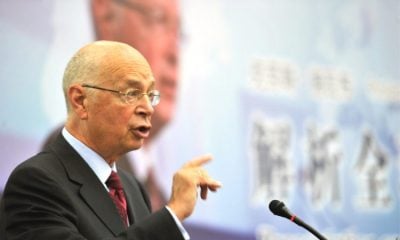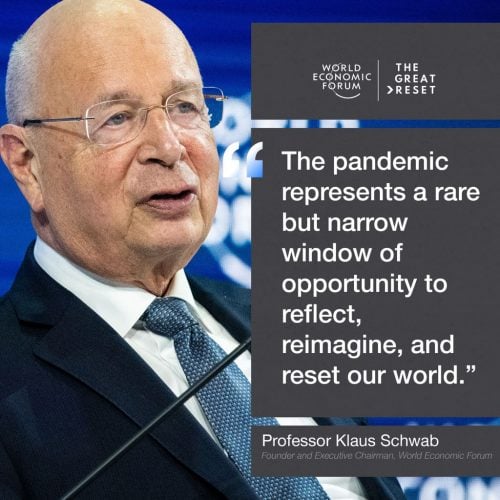A Timeline of “The Great Reset” Agenda
How the great reset ideology pitched its tent in the ‘new normal’ camp:

Incisive article. First posted on GR on May 15, 2021
All Global Research articles can be read in 51 languages by activating the “Translate Website” drop down menu on the top banner of our home page (Desktop version).
Visit and follow us on Instagram at @crg_globalresearch.
***
 Say it’s 2014 and you’ve had this idea for a technocratic Great Reset of the world economy for some time now, but it only works if the entire planet is rocked by a pandemic. How do you go about selling your idea?
Say it’s 2014 and you’ve had this idea for a technocratic Great Reset of the world economy for some time now, but it only works if the entire planet is rocked by a pandemic. How do you go about selling your idea?
“The pandemic represents a rare but narrow window of opportunity to reflect, reimagine, and reset our world to create a healthier, more equitable, and more prosperous future” — Klaus Schwab, WEF
If you are World Economic Forum (WEF) Founder Klaus Schwab, you attempt to sell your vision of a global Utopia via a Great Reset of the world order in three simple steps:
- Announce your intention to revamp every aspect of society with global governance, and keep repeating that message
- When your message isn’t getting through, simulate fake pandemic scenarios that show why the world needs a great reset
- If the fake pandemic scenarios aren’t persuasive enough, wait a couple months for a real global crisis to occur, and repeat step one
It took Schwab and the Davos elite about six years to watch their great reset ideology grow from a tiny Swiss seed in 2014 to a European super-flower pollinating the entire globe in 2020.
The so-called “Great Reset” promises to build “a more secure, more equal, and more stable world” if everyone on the planet agrees to “act jointly and swiftly to revamp all aspects of our societies and economies, from education to social contracts and working conditions.”
But it wouldn’t have been possible to contemplate materializing such an all-encompassing plan for a new world order without a global crisis, be it manufactured or of unfortunate happenstance, that shocked society to its core.
“In the end, the outcome was tragic: the most catastrophic pandemic in history with hundreds of millions of deaths, economic collapse and societal upheaval” — Clade X pandemic simulation (May, 2018)
So, in May, 2018, the WEF partnered with Johns Hopkins to simulate a fictitious pandemic — dubbed “Clade X” — to see how prepared the world be if ever faced with such a crisis.
A little over a year later, the WEF once again teamed-up with Johns Hopkins, along with the Bill and Melinda Gates Foundation, to stage another pandemic exercise called Event 201 in October, 2019.
Both simulations concluded that the world wasn’t prepared for a global pandemic.
And a few short months following the conclusion of Event 201, which specifically simulated a coronavirus outbreak, the World Health Organization (WHO) officially declared that the coronavirus had reached pandemic status on March 11, 2020.
“The next severe pandemic will not only cause great illness and loss of life but could also trigger major cascading economic and societal consequences that could contribute greatly to global impact and suffering” — Event 201 pandemic simulation (October, 2019)
Since then, just about every scenario covered in the Clade X and Event 201 simulations has come into play, including:
- Governments implementing lockdowns worldwide
- The collapse of many industries
- Growing mistrust between governments and citizens
- A greater adoption of biometric surveillance technologies
- Social media censorship in the name of combating misinformation
- The desire to flood communication channels with “authoritative” sources
- A global lack of personal protective equipment
- The breakdown of international supply chains
- Mass unemployment
- Rioting in the streets
- And a whole lot more!
After the nightmare scenarios had fully materialized by mid-2020, the WEF founder declared “now is the time for a “Great Reset” in June of this year.
Was it excellent forecasting, planning, and modeling on the part of the WEF and partners that Clade X and Event 201 turned out to be so prophetic, or was there something more to it?
Timeline
Below is a condensed timeline of events that tracks the Great Reset agenda that went from just a “hope” in 2014 to a globalist ideology touted by royalty, the media, and heads of state the world-over in 2020.
2014-2017: Klaus Schwab calls for Great Reset and WEF repeats message
Ahead of the 2014 WEF meeting in Davos, Switzerland, Schwab announced that he hoped the WEF would push the reset button on the global economy.
The WEF would go on to repeat that message for years.
Between 2014 and 2017, the WEF called to reshape, restart, reboot, and reset the global order every single year, each aimed at solving various “crises.”
- 2014: WEF publishes meeting agenda entitled “The Reshaping of the World: Consequences for Society, Politics and Business.”
- 2015: WEF publishes article in collaboration with VOX EU called “We need to press restart on the global economy.”
- 2016: WEF holds panel called “How to reboot the global economy.”
- 2017: WEF publishes article saying “Our world needs a reset in how we operate.”
Then in 2018, the Davos elites turned their heads towards simulating fake pandemic scenarios to see how prepared the world would be in the face of a different crisis.
2018-2019: WEF, Johns Hopkins & Gates Foundation simulate fake pandemics
On May 15, 2018, Johns Hopkins Center for Health Security hosted the “Clade X” pandemic exercise in partnership with the WEF.
The Clade X exercise included mock video footage of actors giving scripted news reports about a fake pandemic scenario (video below).
The Clade X event also included discussion panels with real policymakers who assessed that governments and industry were not adequately prepared for the fictitious global pandemic.
“In the end, the outcome was tragic: the most catastrophic pandemic in history with hundreds of millions of deaths, economic collapse and societal upheaval,” according to a WEF report on Clade X.
“There are major unmet global vulnerabilities and international system challenges posed by pandemics that will require new robust forms of public-private cooperation to address” — Event 201 pandemic simulation (October, 2019)
Then on October 18, 2019, in partnership with Johns Hopkins and the Bill and Melinda Gates Foundation, the WEF ran Event 201.
During the scenario, the entire global economy was shaken, there were riots on the streets, and high-tech surveillance measures were needed to “stop the spread.”
Two fake pandemics were simulated in the two years leading up to the real coronavirus crisis.
“Governments will need to partner with traditional and social media companies to research and develop nimble approaches to countering misinformation” — Event 201 pandemic simulation (October, 2019)
The Johns Hopkins Center for Health Security issued a public statement on January 24, 2020, explicitly addressing that Event 201 wasn’t meant to predict the future.
“To be clear, the Center for Health Security and partners did not make a prediction during our tabletop exercise. For the scenario, we modeled a fictional coronavirus pandemic, but we explicitly stated that it was not a prediction. Instead, the exercise served to highlight preparedness and response challenges that would likely arise in a very severe pandemic.”
Intentional or not, Event 201 “highlighted” the “fictional” challenges of a pandemic, along with recommendations that go hand-in-hand with the great reset agenda that has set up camp in the nefarious “new normal.”
“The next severe pandemic will not only cause great illness and loss of life but could also trigger major cascading economic and societal consequences that could contribute greatly to global impact and suffering” — Event 201 pandemic simulation (October, 2019)
Together, the Johns Hopkins Center for Health Security, the World Economic Forum, and the Bill and Melinda Gates Foundation submitted seven recommendations for governments, international organizations, and global business to follow in the event of a pandemic.
The Event 201 recommendations call for greater collaboration between the public and private sectors while emphasizing the importance of establishing partnerships with un-elected, global institutions such as the WHO, the World Bank, the International Monetary Fund, and the International Air Transport Organization, to carry out a centralized response.
One of the recommendations calls for governments to partner with social media companies and news organization to censor content and control the flow of information.
“Media companies should commit to ensuring that authoritative messages are prioritized and that false messages are suppressed including though [sic] the use of technology” — Event 201 pandemic simulation (October, 2019)
According to the report, “Governments will need to partner with traditional and social media companies to research and develop nimble approaches to countering misinformation.
“National public health agencies should work in close collaboration with WHO to create the capability to rapidly develop and release consistent health messages.
“For their part, media companies should commit to ensuring that authoritative messages are prioritized and that false messages are suppressed including though [sic] the use of technology.”
Sound familiar?
Throughout 2020, Twitter, Facebook, and YouTube have been censoring, suppressing, and flagging any coronavirus-related information that goes against WHO recommendations as a matter of policy, just as Event 201 had recommended.
Big tech companies have also deployed the same content suppression tactics during the 2020 US presidential election — slapping “disputed” claims on content that question election integrity.
2020: WEF declares ‘Now is the time for a Great Reset’
After calling for a great reset in 2014, the Davos crowd repeated the same ideology for a few more years before pivoting towards simulating faux pandemic scenarios.
A few months after the WEF established that nobody was prepared to deal with a coronavirus pandemic, the WHO declared there was a coronavirus pandemic.
All of a sudden! the great reset narrative that the WEF had been nurturing for six years, found a place to pitch its tent in the “new normal” camp.
“The pandemic represents a rare but narrow window of opportunity to reflect, reimagine, and reset our world to create a healthier, more equitable, and more prosperous future,” Schwab declared on June 3, 2020.
And that’s where we’re at today.
- The Davos elites said they wanted a global reset of the economy many years ago
- They role-played what would happen if a pandemic were to occur
- And now they’re saying that the great reset ideology is the solution to the pandemic, and it must be enacted quickly
The great reset is a means to an end.
Next on the agenda is a complete makeover of society under a technocratic regime of un-elected bureaucrats who want to dictate how the world is run from the top down, leveraging invasive technologies to track and trace your every move while censoring and silencing anyone who dares not comply.
*
Note to readers: Please click the share buttons above or below. Follow us on Instagram, @crg_globalresearch. Forward this article to your email lists. Crosspost on your blog site, internet forums. etc.
Tim Hinchliffe is the editor of The Sociable. His passions include writing about how technology impacts society and the parallels between Artificial Intelligence and Mythology. Previously, he was a reporter for the Ghanaian Chronicle in West Africa and an editor at Colombia Reports in South America. [email protected]
Featured image is from The Sociable

